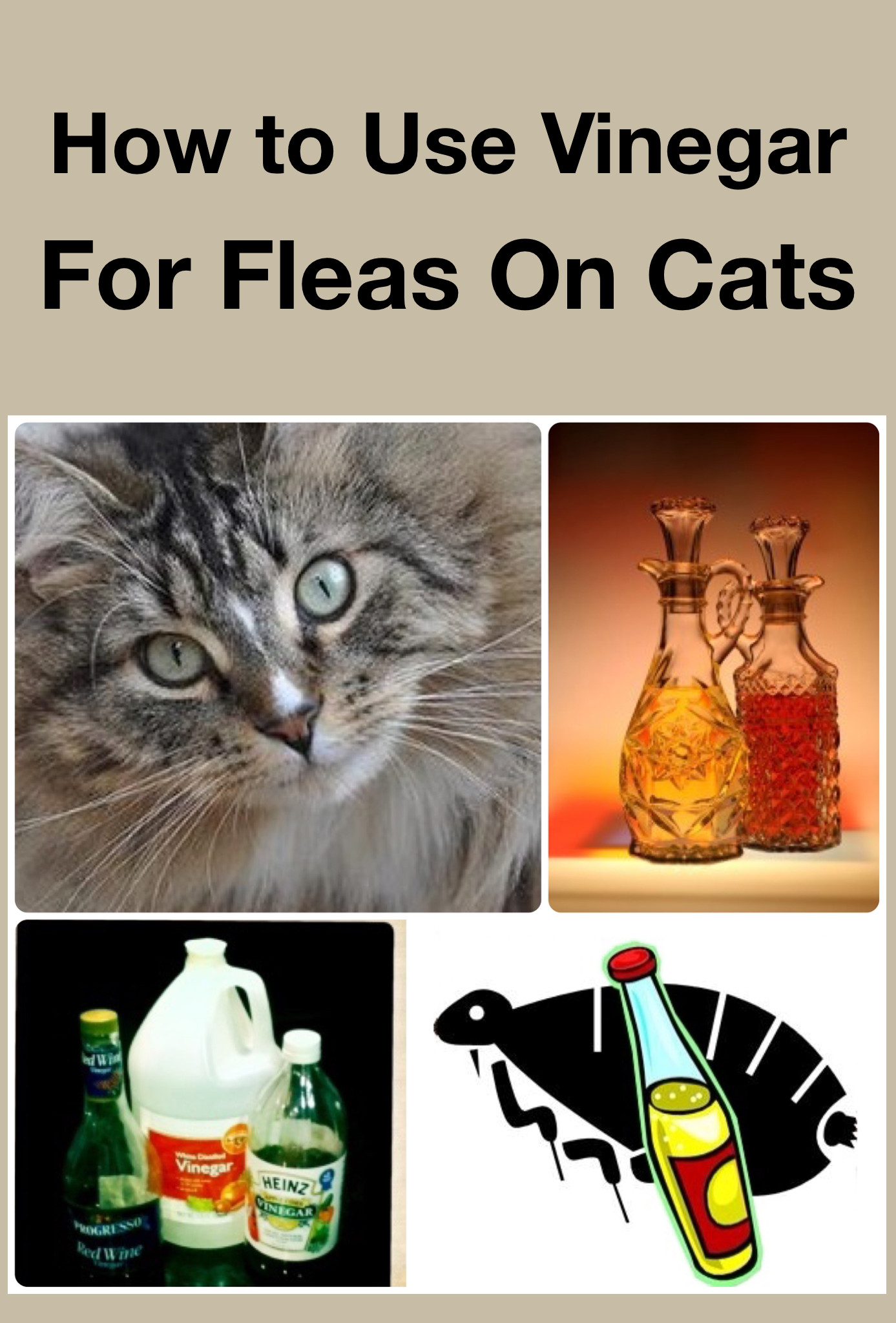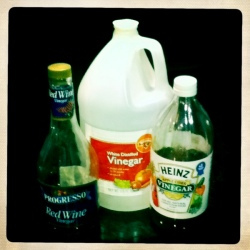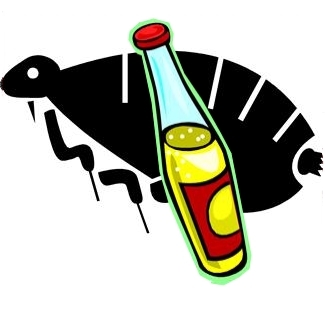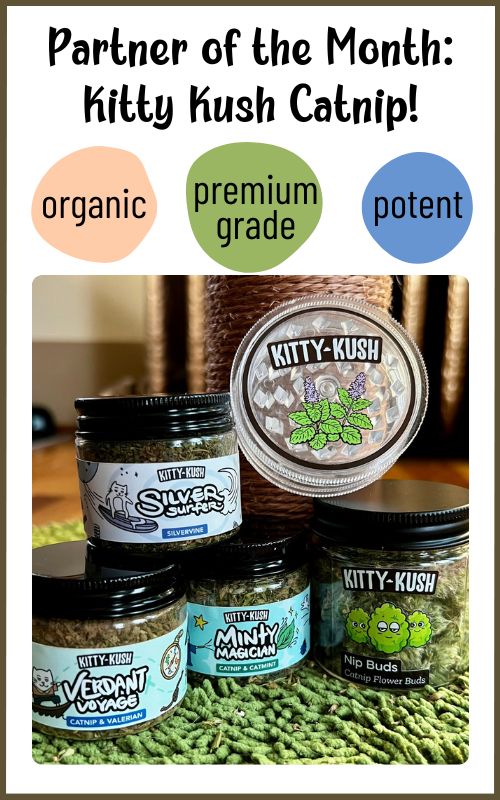- Home
- Maine Coon Cat Health
- Vinegar For Fleas on Cats
Vinegar For Fleas On Cats:
3 Ways To Use This Effective Homemade Flea Repellent!
When we had a flea problem, we tried everything! Then I heard about using vinegar for fleas on cats, and I had to give it a try.

There are different ways you can use vinegar for killing adult fleas, such as in the bath, applying directly to your pets fur or skin, or even in their drinking water (dogs only - more info on that below).
PS: One of these methods I found to be much more effective than the others!
Does vinegar help with fleas?
I was hoping it would kill the pests upon direct contact.
But if that were the case, the flea product industry would be out of business!
We'd all just get a bottle at the local supermarket and our troubles would be over!
Using vinegar for fleas on cats is an effective remedy, though. This is a homemade flea killer everyone should know about.
I want to mention another resource for quickly killing fleas. Getting rid of these pests on your feline friend can be really hard.
That's why we've created an effective, easy to follow action plan. Because we know you want to stop researching on the internet - you just need the fleas gone, now. Feel free to check it out!
Pros to Using Vinegar for Fleas on Cats:
This is a natural way to kill fleas, for cat parents who are avoiding the harsh chemicals and pesticides found in flea collars and topical treatments.
If you prefer natural remedies, this can be part of your arsenal against a flea infestation.
Along with natural flea treatments such as diatomaceous earth, baking soda and brewer’s yeast, it's quite safe.
One of my cats had adverse reactions to topical flea treatments, so we embarked on a mission to learn natural solutions.
We don't recommend the use of essential oils for fleas, as these can pose health dangers for animals.
Only use essential oils if you are already well-versed in their use and confident in your knowledge.
Cons to Using Vinegar For Flea Control:
Vinegar doesn't affect flea eggs, flea larvae or pupae. At any given time, most of the fleas in your house are in these stages of the life cycle.
Killing the adult fleas will prevent them from laying eggs, though.
How To Get Rid of Fleas With Vinegar:
 Different Kinds of Vinegar
Different Kinds of VinegarVinegar is very acidic and sour, and cat fleas just hate it. So mostly it just repels them.
The theory is that a flea would starve before it would go near a pet who smells like vinegar. So we use this to our advantage with using vinegar for fleas on cats.
Method #1:
In The Bowl
One of the ways vinegar kills fleas on pets is to add it to their drinking water.
Some say that a bit (think: teaspoon) of organic apple cider vinegar in their water will alter their skin, making it unpalatable (acidic) to the buggers.
Pros: There are many fans of this method, who swear that doing this with their dog really helps get rid of fleas.
It even seems to repel them so well that some continue to use it for natural flea prevention.
Cons: Never try this with cats. A cat's ph should be between 6.0 - 6.5. Vinegar is very acidic.
Adding vinegar to their diet can lower it below 6.0, causing serious health problems.
Overall safety: This method had more traction years ago. We've covered it for informational purposes and because you'll still see it recommended from time to time.
But, it's recognized now that using it in the drinking water can have harmful health issues to dogs as well as cats, and it's better avoided.
As an acid, it can wear away their tooth enamel, as well as damage the lining of their esophagus and stomach, causing vomiting and ulcers. [1]
But that doesn't mean you can't use vinegar to repel the fleas.
Applying it topically (see below) will have the same effect, if not better.
The cats coat will be acidic, and just plain yucky to fleas. They will go away and stay away.
Many years ago we tried this with our dog. She hated the taste, even when we used cider vinegar (which should taste better than white vinegar) and we added just a little to her water bowl.
So she ended up drinking less than she should, during the heat of the summer. We gave up on this method and just used it topically.

How To Apply Vinegar To Cats Or Dogs:
Method #2:
In The Bath:
We've found two measures that work well. The first involves giving a cat a natural flea bath.
As many cat owners know, Dawn dish soap is a gentle way to bathe a cat and help with fleas.
It must be left on for at least ten minutes. And even then, you may end up rinsing and drying a cat who still has lots of live fleas in his fur.
Try filling a couple of large cups with plain white vinegar (if you're out, cider vinegar could be substituted) and taking them to the bath with you.
When lathering your pet, mix with a bit of the vinegar. Let it sit if you can. Rinse with warm water and alternate with a small amounts of undiluted vinegar. Repeat.
Work as much of the vinegar as you can into your cat’s fur. Try to retain about half the vinegar to rub into your wet, rinsed cat.
Let him air dry, if it is warm enough. (It's safe for him to groom himself once fully dried.)
This natural flea shampoo method works much better than washing with dish soap alone. The difference is noticeable.
The fleas will fall off into the bath water easily, instead of clinging to the fur and hiding in the face and whiskers.
This is, by far, the closest I came to seeing vinegar kill fleas, and the most effective way to use vinegar I found.
It didn't get every flea, but there was a marked difference once I added vinegar rinse to the bathing ritual.
In my opinion, this is the best way to use vinegar for fleas on cats.
Pro Tip: Bring a flea comb in the bath, and comb them out right through the wet, soapy fur.
For the next few days, the pests will find him quite repulsive! As an added bonus, your pet's fur will probably be softer than you have ever felt it.
 Vinegar Kills Fleas
Use it For a Natural Flea Killer
Vinegar Kills Fleas
Use it For a Natural Flea KillerMethod #3
Natural Flea Repellent Between Baths:
To make your own homemade flea spray, fill a spray bottle with equal parts water (with a couple drops of soap) and white vinegar.
Drench your dog or cat’s coat with the vinegar solution. Let him air dry, if it's warm enough.
He will once again feel clean and fresh, and the vinegar really is wonderful for conditioning the coat. So soft!
If using a squirt bottle frightens your pet, some pet owners find success using a bowl and a washcloth. Many pets come to really enjoy this "rubdown."
Another popular natural flea spray uses lemon juice. It's safe to alternate between these two home remedies as repellents.
Bonus Method: Make Your Own Overnight Flea Trap
Fleas are attracted to warmth, and to light colors.
At night, when the home is quiet, they come out to feed.
All you need is hot water, liquid soap, a few saucers or even old plastic food container lids, and a desk lamp.
Place some soapy water in the saucer. It doesn't matter if the suds dissolve, the soapy water solution will still trap the fleas when they hop in.
Without soap, they can actually hop right off the surface of water! Place the lamp as close as possible. It will mimic the warmth of a pet in bed.
We did this along the woodwork where the wall and floor meet. During the day, the fleas would be hiding under the woodwork.
Another good area to target is near a couch or other upholstered furniture, and on rugs.
Just make sure the lamp isn't too warm or touching anything, for safety.
Don't add vinegar, since it repels pesky fleas and the goal here is to entice them. In all likelihood you'll wake up to some dead fleas in the morning.
Frequently Asked Questions (FAQ's):
Does vinegar repel fleas?
Does vinegar repel fleas?
Although it doesn't kill them, vinegar will help repel fleas. They don't like the smell or taste of it, so a pet who has a diluted combination of vinegar and water on it's skin and fur should be somewhat protected.
It's not as effective as store-bought flea products. But for natural at-home remedies, vinegar is one of the more effective methods and proven to repel fleas. It's a good alternative.
Will Vinegar Kill Fleas?
Will Vinegar Kill Fleas?
Although we found using vinegar for fleas on cats to be a great home remedy, we didn't find that it kills them outright.
We succeeded in getting rid of fleas by using multiple products. The quickest and surest way to victory is by treating pet’s fur, home and sometimes even the yard.
Do fleas hate vinegar?
Do fleas hate vinegar?
After adding vinegar to a dawn soap bath, I can say with certainty, yes they do! Once I added the vinegar, they literally fell off, into the bath water. They didn't try to hide in the fur anymore. The difference was notable.
Does vinegar kill flea eggs?
No, it can't penetrate the outer shell of a flea, egg, larvae or pupae.
When eggs fall off a pet, they usually end up in pet bedding and sometimes in carpets or upholstered furniture. Spraying your cat’s bedding with the homemade spray will help repel them once they hatch.
Is apple cider vinegar or white vinegar better?
They both seem to work about the same. The apple cider option has a more pungent aroma, so white is usually recommended for use on the fur. But either will work.
Many pet owners feel their pet finds the apple cider mixture less off-putting.
If you've read this far, you are probably trying many different natural flea remedies.
This is a difficult battle, but one that can be won!
You can visit our page on top picks for flea products to see some best-sellers and compare pet flea products.
« Back to Maine Coon Health
Recent Articles
-
Memory Lane Month Begins!
Apr 15, 25 10:22 PM
We're thrilled to start our "Memory Lane Month" event by visiting some cherished moments from our community! We're in the process of restoring meaningful community stories like this one, to preserve t… -
Will a Maine Coon Protect Its Owner From Danger or an Intruder?
Apr 09, 25 10:41 PM
Plenty of people are curious: Will a Maine Coon protect its owner if something happens? Let’s talk about what this means, and what kind of protector a Coonie is. -
9 Types of Maine Coon Cats and How to Tell Them Apart
Apr 09, 25 03:58 PM
When people say "types of Maine Coon cats," they're usually talking about color. But as Coonie lovers know, there’s a lot more to it than that! From wild-looking European lines to polydactyl paws and…




